Key points
Orsino is a character from Twelfth Night, a play by William Shakespeare, an English playwright.
Twelfth Night is a fast-paced comedy that contains romantic plots, mistaken identities and practical jokes.
Orsino is a wealthy duke who lives in Illyria.
Orsino gets caught up in a love triangle with Olivia and Viola (Cesario).
Did you know?
Orsino’s first line, which opens the play, is one of the most famous lines in Shakespeare’s work:
If music be the food of love, play on
Plot summary
Orsino’s key moments
Click through the slideshow to see Orsino’s key moments
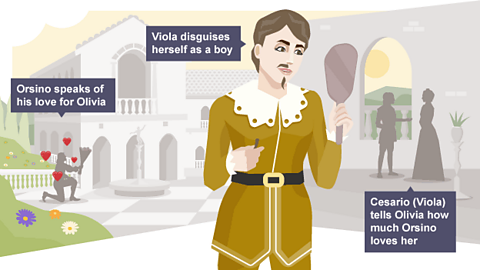
Image caption, Orsino is sad because he loves Olivia but she does not return his feelings. He employs a man called Cesario to pass his messages to Olivia, unaware that Cesario is actually a woman called Viola.
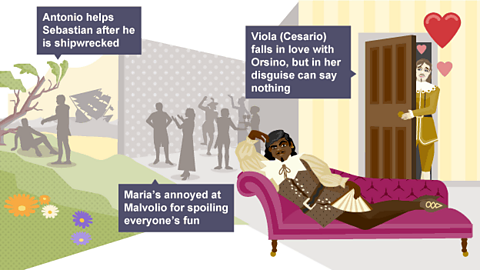
Image caption, Cesario (Viola) and Orsino become friends. Viola (Cesario) falls in love with Orsino but cannot share her feelings with him because of her disguise.
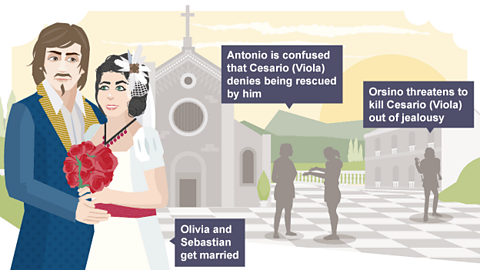
Image caption, Orsino finds out that Olivia loves Cesario (Viola) and has married him - although she has actually married Sebastian, Viola’s twin brother. Orsino is so angry with Cesario (Viola) that he threatens him.
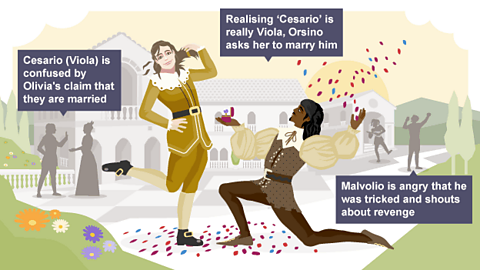
Image caption, Viola reveals her true identity and it becomes clear that Olivia has actually married Sebastian. Orsino asks Viola to marry him.
1 of 4
Character traits
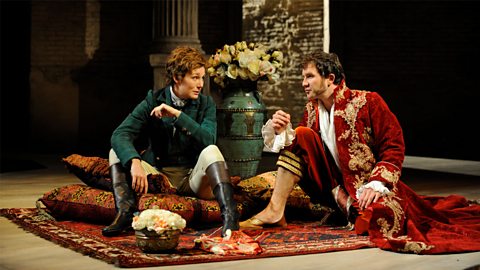
Superficial
Orsino demonstrates a superficial understanding of love. The idea of being in a relationship is more important to him than the other person. He speaks about love in an exaggerated and dramatic way. He very quickly forgets about his feelings for Olivia and proposes marriage to Viola at the end of the play.
Self-indulgent
Orsino feels sorry for himself, listening to sad songs after Olivia refuses to return his feelings. However he soon forgets his feelings for Olivia when he learns of Viola’s true identity and proposes to her.
Relationships
Orsino has an idealisedWhen something is seen as perfect. view of Olivia and claims he fell in love with her at first sight.
Orsino quickly trusts Cesario (Viola) and asks him to take his messages to Olivia. Orsino shares his emotions and disappointments with Cesario (Viola) and develops a close friendship with him. He is hurt and angry when he discovers Olivia loves Cesario.
Who loves whom at the beginning of the play?
How does Shakespeare use dramatic irony in Orsino and Cesario’s (Viola’s) relationship?
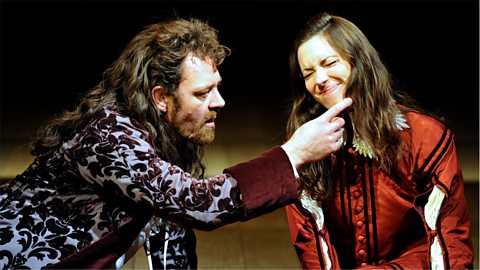
Orsino makes a speech about how feminine Cesario (Viola) appears to be. This creates a sense of dramatic irony. Dramatic irony is when the audience knows more than the characters on stage. The audience knows that Cesario is really a woman called Viola, but Orsino does not.
Changes in character
At the start of the play, Olivia is the object of Orsino’s affections. Orsino is confident that Olivia will eventually return his feelings.
He reacts angrily when he discovers Olivia’s feelings for Cesario (Viola) and threatens him (her).
When he discovers Cesario’s true identity, he quickly loses interest in Olivia and proposes to Viola.
Activity - Order it
What do these key quotations mean?
O, when mine eyes did see Olivia first,
Methought she purged the air of pestilence!
Orsino
Act 1, scene 1
Pestilence means a type of disease, like the plague. In Shakespeare’s day it was believed that the plague spread through the air. Orsino’s language here is suggesting that Olivia’s beauty is so strong that it cleans the air of disease.
Come, boy, with me; my thoughts are ripe in mischief:
I’ll sacrifice the lamb that I do love,
To spite a raven’s heart within a dove.
Orsino
Act 5, scene 1
How does Orsino use language here to express his anger?
Orsino uses metaphors here to express his anger about the fact that Olivia loves Cesario. The lamb is Cesario (Viola) and Olivia is the dove with a raven’s heart. His language suggests he is threatening Cesario (Viola) with violence even though he considers Cesario (Viola) to be a friend as well as an employee.
One face, one voice, one habit, and two persons.
Orsino
Act 5, scene 1
Orsino is amazed when he sees Sebastian and his twin, Viola, together. Their identical appearance has caused much confusion to many characters at this point.
Listen to a scene
In Act 1, scene 1, Orsino opens the play with lines about music and love. He imagines that music is the food that feeds love and he wishes to have too much so that he becomes sick of love.
Listen to this audio clip of the scene:
Orsino: If music be the food of love, play on;
Give me excess of it, that surfeiting,
The appetite may sicken and so die.
That strain again, it had a dying fall;
O it came o’er my ear like the sweet sound
That breathes upon a bank of violets,
Stealing and giving odour. Enough; no more.
’Tis not so sweet now as it was before.
O spirit of love, how quick and fresh art thou,
That, notwithstanding thy capacity,
Receiveth as the sea. Nought enters there,
Of what validity and pitch soe’er,
But falls into abatement and low price
Even in a minute. So full of shapes is fancy,
That it alone is high fantastical.
Test your knowledge
GCSE exam dates 2025
Find out everything you need to know about the 2025 GCSE exams including dates, timetables and changes to exams to get your revision in shape.

More on Twelfth Night
Find out more by working through a topic
- count5 of 6
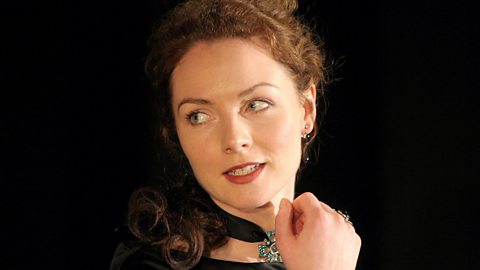
- count6 of 6
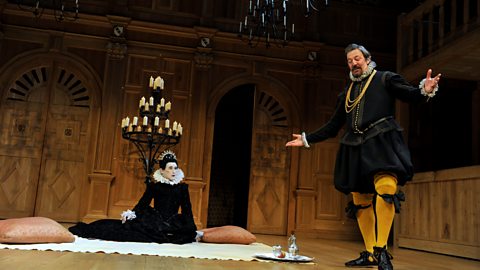
- count1 of 6
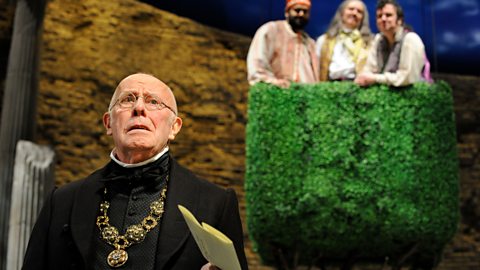
- count2 of 6
